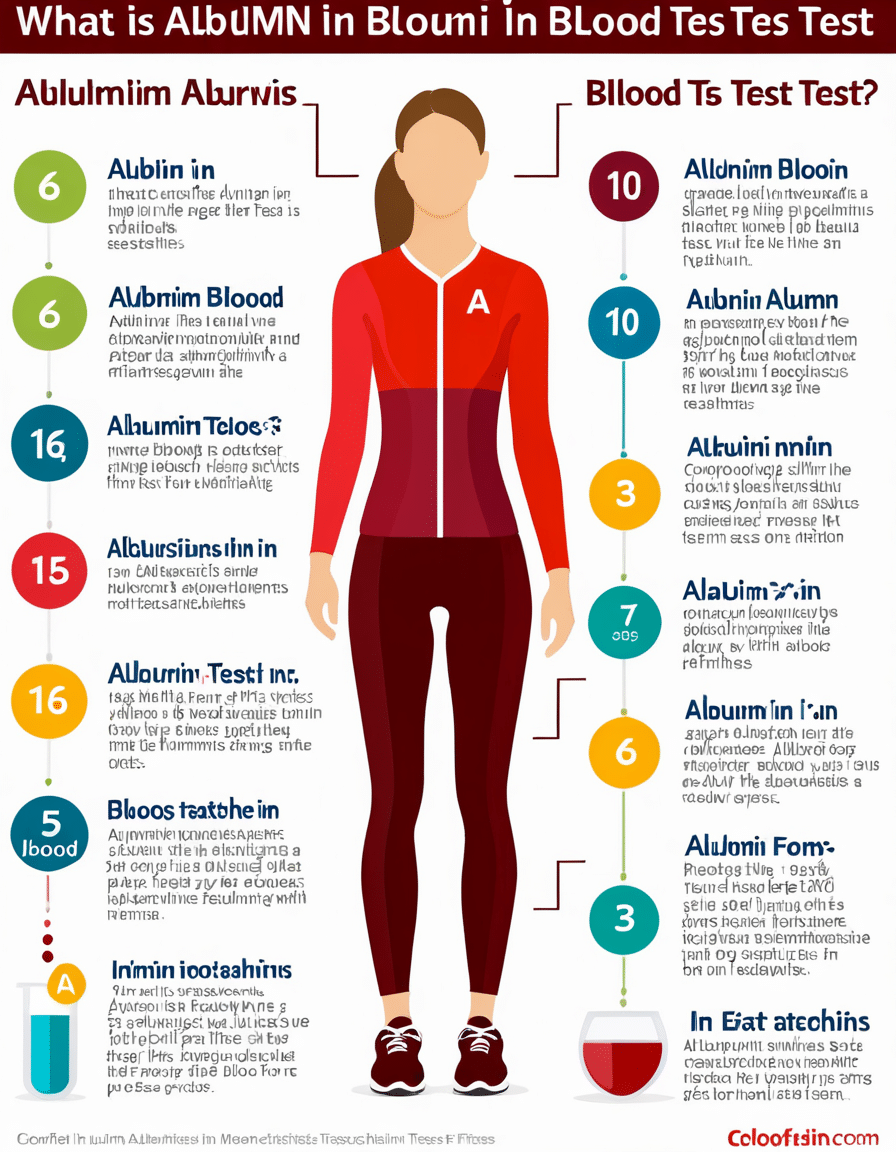When you dive into the world of health and fitness, you quickly realize how important your body is – and what goes on inside it matters just as much as those muscles you’re building. One key component to keep an eye on during any blood test is albumin. But what is albumin in a blood test? This crucial serum protein offers insights into your bodily functions that can help you make informed health decisions. Let’s break it down and understand why it matters for your health and how it can play a role in your journey to getting shredded!

## What Is Albumin in Blood Test and Why It Matters
Albumin, the superstar of proteins, is primarily produced by the liver and serves a vital role in your bloodstream. Think of it like the ultimate bodyguard – it maintains oncotic pressure, which keeps fluid where it belongs, ensuring it doesn’t leak into surrounding tissues. Plus, albumin is a carrier for hormones, vitamins, and drugs while helping regulate blood volume and pressure. With such a heavy workload, low levels of albumin can signal various health issues, which makes it a major marker in blood tests. So, the next time someone asks, “What is albumin in a blood test?” you’ll know it’s about more than just numbers on a sheet.
When albumin levels drop, it can shine a light on problems lurking beneath the surface. It can hint at liver dysfunction, kidney disease, malnutrition, or even fluid imbalances. Therefore, keeping tabs on albumin should be part of your wellness game plan. We’re not just lifting weights here; we’re lifting life’s challenges, too.
But why should you care? Because understanding albumin can guide your fitness journey. If you’re hitting the gym hard but not seeing the results you want, it might be related to some internal imbalances. Just like tracking your protein intake helps you reach your workout goals, tracking albumin can help you address broader health concerns.

The Top Reasons to Monitor Albumin Levels
Indicator of Liver Health
Your liver plays a massive role in your body’s metabolism and detoxification processes, and albumin levels can provide crucial insights into its health. When liver function deteriorates – think cirrhosis or hepatitis – albumin levels often drop significantly. By monitoring these levels, you can catch potential liver issues early. A simple blood test can open the door to proactive health measures, giving you the best chance to keep your fitness routine on track.
Kidney Function Assessment
Ever heard that your kidneys are your body’s filtration system? Well, low albumin can signal kidney troubles since they typically retain proteins, preventing them from leaking into urine. Conditions like nephrotic syndrome can cause significant protein loss, leading to decreased serum albumin levels. If you want to truly maximize those gains, pay attention to your kidney health, because neglecting it can slow you down in achieving those six-pack dreams!
Nutritional Status
Are you fueling your body properly? It could be reflected in your albumin levels. Low albumin may indicate malnutrition or absorption issues from conditions like inflammatory bowel disease. If you’re eating like a champ but not seeing the results, a peek at your albumin levels can give you insight into whether your nutritional intake is sufficient! Knowledge is power, and knowing where your nutrition stands can make significant change in your fitness regimen.
Fluid Balance Monitoring
Albumin is like the referee of fluid balance in your body, ensuring everything runs smoothly. Conditions disrupting this balance – such as heart failure or sepsis – can show low albumin levels. Ditching the fluff and focusing on vital aspects of health makes all the difference. You want to be at your peak, and knowing how albumin plays into the fluid balance is a step in that direction.
Complications in Chronic Diseases
Diabetics and those with chronic inflammatory conditions must keep a sharp eye on their albumin levels. An unexpected drop can indicate potential complications like diabetic nephropathy, which can damage the kidneys. Regular monitoring helps you take control and hit the gym with confidence, knowing you’re tackling health issues head-on.
Assessment of Pregnancy Complications
For expectant mothers, understanding what is albumin in a blood test becomes particularly vital. Low albumin levels during pregnancy may suggest issues like preeclampsia. This knowledge equips healthcare providers to manage pregnant women actively and effectively, ensuring both mother and baby stay healthy.
Detection of Inflammatory Conditions
Albumin levels can drop during episodes of inflammation or acute illness. For those striving for fitness, knowledge of these levels can help you recognize when it’s time to take a break and let your body heal. Listen to your body; when it whispers, “I need a rest day,” it’s essential to take action.

What is HCT in Blood Test?
You’ve probably heard the term Hematocrit (HCT), but what is HCT in a blood test? It measures the proportion of your blood made up of red blood cells. A low HCT level typically signals anemia, while a high level might indicate dehydration or even polycythemia. Evaluating HCT levels is crucial for understanding your overall blood health and how it may affect your performance. You wouldn’t want to hit the gym feeling sluggish, now would ya?

Overview of Other Key Blood Test Components
Let’s take a quick look at what else goes down during blood tests!
Thyroid-Stimulating Hormone (TSH) is fundamental in assessing thyroid function. Your thyroid plays a pivotal role in metabolism, energy levels, and physical performance. An irregular TSH level could indicate conditions like hypothyroidism or hyperthyroidism.
Aspartate Aminotransferase (AST) is an enzyme found in the liver and muscles. Elevated AST levels can hint at liver damage, making this measurement essential for your overall health.
Alanine Aminotransferase (ALT) is another critical liver enzyme. If you find high ALT levels in your tests, it could signal liver damage or disease, especially linked to alcohol or viral hepatitis.
Mean Corpuscular Volume (MCV) measures the average size of red blood cells and is vital for diagnosing different types of anemia. An aberration might indicate macrocytic or microcytic anemia – information that could revolutionize your training strategy.
Mean Corpuscular Hemoglobin (MCH) indicates the average hemoglobin per red blood cell. Variations can guide decisions in managing multiple conditions, including thalassemia or disturbances in blood loss. It’s all connected!

The Big Picture
Understanding albumin and various blood test components isn’t just for doctors and scientists; it’s crucial for you, too, as you sweat it out in the gym. These levels provide insights that can help diagnose and manage countless health conditions. For your journey of getting shredded, knowledge is your secret weapon. Be proactive about your health for optimal energy and performance.
With regular lab tests, you and your healthcare provider can work together to catch anything sneaky before it can derail your fitness goals. When you’re armed with information about indicators like albumin, HCT, TSH, AST, ALT, MCV, and MCH, it puts you in the driver’s seat for better health outcomes. Embrace your health by understanding what your blood test results mean and how they shape your wellness journey.
Remember, folks: lifting heavy is vital, but lifting your health knowledge? That’s the real game-changer! Get on the path to living your best life, and never forget that small steps can lead to substantial changes! So, let’s get to it and make those gains!
What is Albumin in Blood Test?
Understanding what is albumin in blood test can shed light on how your body’s proteins are running the show. Albumin is a key protein in your blood, playing a big role in maintaining pressure in your blood vessels and transporting various substances, like hormones and vitamins. You might be surprised to learn that normal albumin levels can help keep your blood volume in check, which is pretty crucial for overall health.
The Lowdown on Albumin Levels
Did you know that if your albumin levels are off, it might indicate issues with your kidneys or liver? Yep! Poor liver function can lead to lower albumin production, so the connection there runs deep. To give you an idea, a healthy range typically falls between 3.5 to 5.0 grams per deciliter. Speaking of healthy habits, it’s also worth noting how staying hydrated impacts these levels. Ever wondered How many Oz Of water a day you should drink? Hydration heavily influences albumin concentration, so keep your water intake in check.
Fun Facts About Albumin and Health
Here’s a fun nugget: Albumin makes up about 60% of total protein in your blood. That’s impressive! If we dig a little, it turns out albumin’s role goes beyond just fluids. Without it, you wouldn’t be able to maintain the right pressure to keep nutrients where they belong. And if you’re planning a trip, how about packing some Kids luggage to keep the little ones organized while you focus on your health? After all, knowing what is albumin in blood test results equips you to be proactive rather than reactive about your health.
So, keep an eye on your albumin levels along with understanding other blood metrics, like What Is rbc in blood test results. It’s all interconnected! Just remember, whether you’re sipping coffee or flipping through bed Bugs Pictures (yikes!), maintaining balance in your body requires keeping tabs on all these good ol’ factors. And who knows? The more you know, the more you might feel like you’re part of the Iphone 14 Pro Max Cases club—because health is just as stylish as having the latest gadget!



























